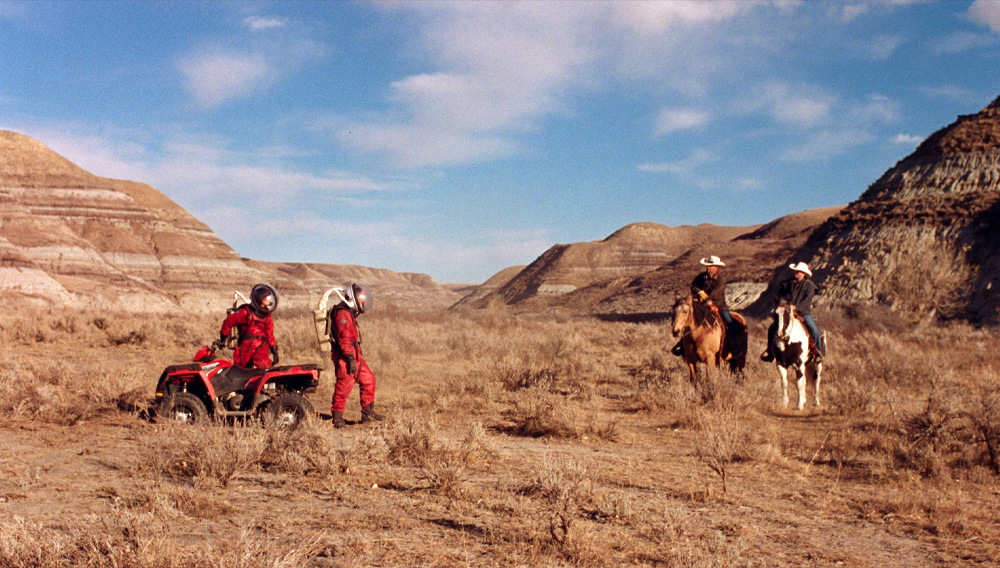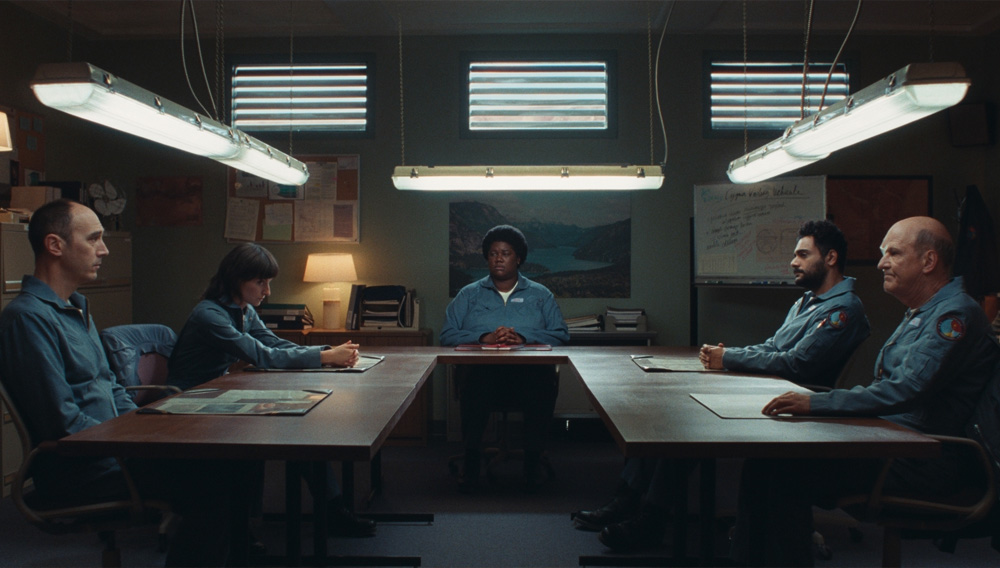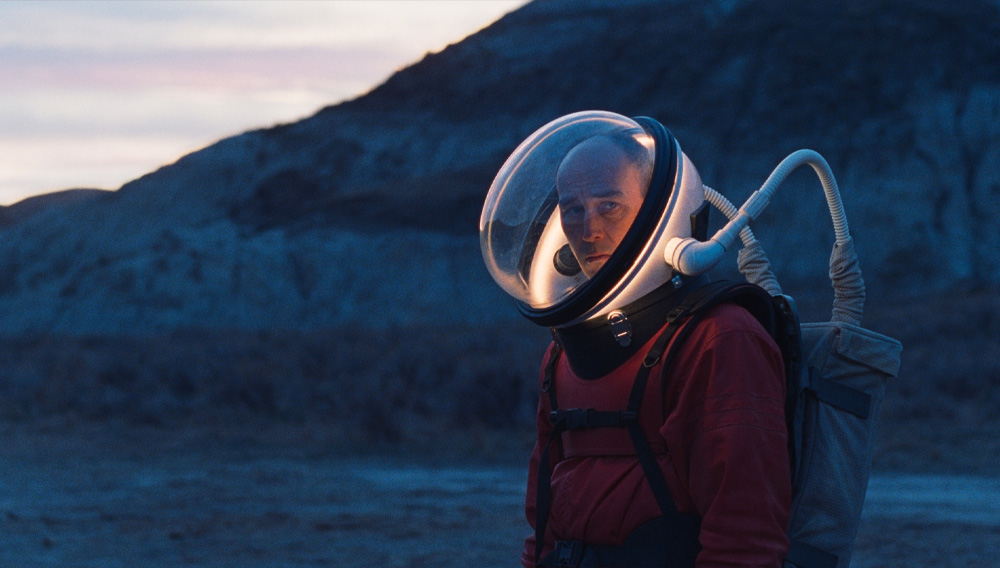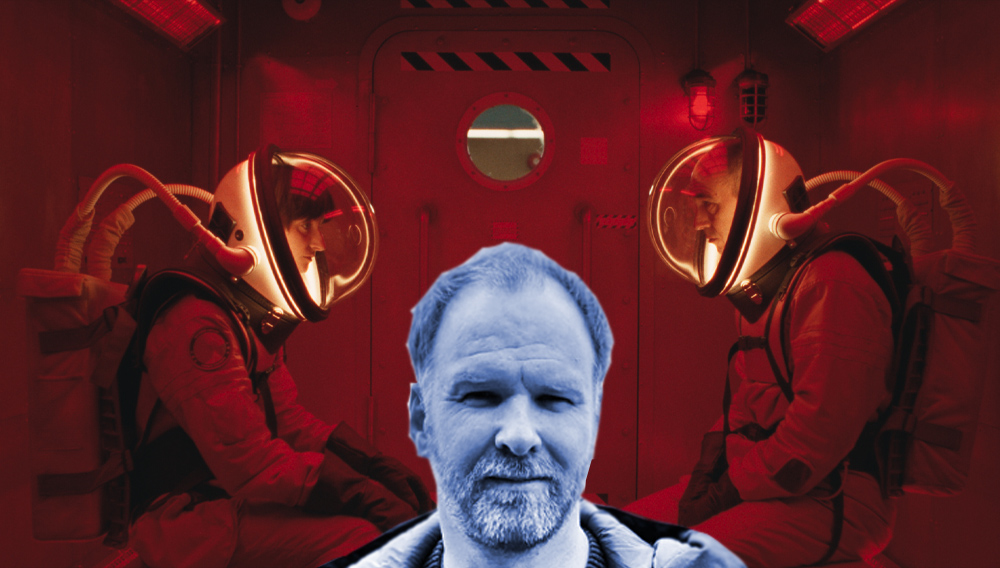Space is the place—unless it’s an earthbound simulation of the real thing in Quebecois writer-director Stéphane Lafleur‘s wry, absurd and philosophical human comedy Viking. The name alludes to the United States’ Viking space probes, and their 1970s missions to Mars. In this Toronto International Film Festival 2022 breakout, a group of French-Canadian volunteers is selected to enact a manned expedition meant to parallel a real-life voyage and colonization, for the purposes of behavioral study. Each “astronaut,” regardless of gender-matching, is chosen as a psychological double for one of the film’s (imagined) real interstellar travelers. But one of them, the incredibly earnest high-school gym teacher David (Steve Laplante) takes matters way too seriously. Sequestered in a retro-futuristic base camp in a western Canadian desert, the surrogate pioneers cope with various emotional challenges and petty conflicts as the tension between actual and contrived lives begins to fray their nerves. Audiences can read plenty into the film’s pandemic-era subtext (haven’t we all felt lost in space these past three years?), or simply relish the unlikely pleasures of its “Severance” meets 2001: A Space Odyssey vibes. Keyframe caught up with Lafleur, whose previous films include the festival favorite Tu dors Nicole (2014), for a recent chat about life on his cinematic faux Mars, his lifelong love of science fiction movies, and the film’s underlying question, “How do we live together with the least pain possible?”

KEYFRAME: The film pays homage to space movies, but you seem more invested in the peculiarities of human behavior. What inspired your concept?
STÉPHANE LAFLEUR: The first sparkle of the film was a photograph exhibit I saw 12 or 13 years ago in New York. It was an exhibit of a French photographer named Vincent Fournier. These were large prints of small astronauts in the middle of the desert. And the sparkle was: “Hmm. It’s possible to pretend that you’re somewhere else with very few things, just a costume in the right set up and suddenly we’re on another planet.” I found out the people in the picture were participating in the Mars Society. It’s a serious thing going on for a long, long time now in the desert in Utah. These people pretend to be on Mars. They’re experiencing their living together and following a protocol. What would be the life if we go to Mars one day? This idea of people pretending to do something else really stuck with me. I thought it was a good premise for a film, because making film is about pretending.
You can read the film on different levels. I grew up with sci-fi movies. I’m a Spielberg child. I’m a Star Wars kid. They’re probably the first films I saw when I was young. That’s one of the powers of cinema, to bring us into a different universe and open these doors. At the same time, I’m thinking about my reality as a filmmaker and Quebec and the budget that I can get. It was important for me to find an idea that was in harmony with that budget context, so suddenly the film becomes about Quebec astronauts pretending to be Americans. There’s all this parallel that is made in the movie as well. It’s a film pretending to be a big sci-fi movie, which it’s not. It was fun to play with all these different concepts. The question of living together has been part of all my movies. I realize now that it’s an important theme. How do we live together with the least pain possible?
Part of the experience watching the film is trying to get a grasp on the concept, the incongruity between the characters’ actual situation and what they’re supposed to be emulating. I was sometimes reminded of “Seinfeld,” where personality traits and tics get amplified into crisis.
The first thing that strikes you is the sci-fi aspect of it, the costumes and the look of it. But when you scratch a little bit, it’s not a sci-fi movie. It’s almost a sitcom. It’s almost a reality show—put together the guinea pigs and see how they do it, how they manage to function.
Are you a fan of any reality TV?
I don’t really watch these shows. There are a lot of things in our society that you don’t need to watch to know what it is. But of course, the whole question of pretending to be someone else also reflects all our lives on social media. The life you actually have and the life you make people think you are having.

What kind of thought went into the characters and the actors playing them?
We went instinctively with bold characters, almost stereotypes, like “The Office” in space. Again, back to sitcoms, reality TV, stuff like that. We were inspired by people we know.
I don’t do a lot of rehearsal. I like to do a reading with everyone at the same time. Go through the script, make sure that everyone has the same information, and that everyone is going to make the same film. That’s the most important thing for me. You make sure that people understand what’s in your head and what you’re aiming for. As soon as every department—including the actors—understands what you’re trying to achieve, hopefully they will bring more to it and elevate the project in a good direction.
Did you dig into any “captain’s logs” from actual space journeys for background?
I spent a lot of time reading about simulations that are made on Earth and a little bit about space missions. At some point I stopped because it moves so fast, faster than us writing the film. I wasn’t going to do The Martian.
The Montreal film scene is fairly small, but is it closely knit as well?
Everybody mostly knows each other. We’re aware of who is doing what. It’s an ecosystem. There’s a lot of talented people around here. I end up working with the same people each time.
Where did you find your Mars?
We shot the interiors around Montreal, but all the exteriors were shot in Alberta. We wanted to shoot in the U.S., but because of the pandemic it was not possible for insurance. We ended up in Alberta, which was fun to start the film with because it put everyone in a bubble. We really reinforced the group spirit. There’s not a lot of CGI in the film. Even the station, when you see it in the background, it’s a miniature like they did in the old times. That was Fall 2021.

The spacesuits have a vintage look, like 1950s science-fiction book covers. These touches felt nostalgic and reminded me of what people in earlier eras imagined outer space was going to be like.
The picture I saw in New York 12 years ago, this suit is almost the same. I got inspired by these things. Just the guy in the middle of nowhere, on another planet. We didn’t want the film to be a parody and, of course, there’s humor in the film. I don’t know if we achieved that, but that was the goal of not being a parody. We wanted you to believe in the involvement of David in this mission, that he believes he can make a difference. The phrase we kept saying was “dream and deception.” Even if it will look like this, it doesn’t look like this.
No spoilers, but that phrase comes into play very clearly by the end of the film, in the emotional aftermath. It makes for a poetic and resonant conclusion.
It’s about finding what’s your right place in this world. Is it trying to be someone else or trying to be yourself? These are simple things in a way, but then to play with them in an absurd way with this concept.
What are your all-time favorite space movies?
I paid my homage to Stanley Kubrick in this. There’s a bit of Solaris, the original one. When I was young, I was a big fan of Logan’s Run. I kept watching Logan’s Run for some reason. Close Encounters of the Third Kind. We talk a lot about sci-fi movies when we talk about Viking. But I’m always interested in a weird proposition, like Yorgos Lanthimos films—twisted concepts about human questions.
[Viking is now streaming exclusively on Fandor.]




